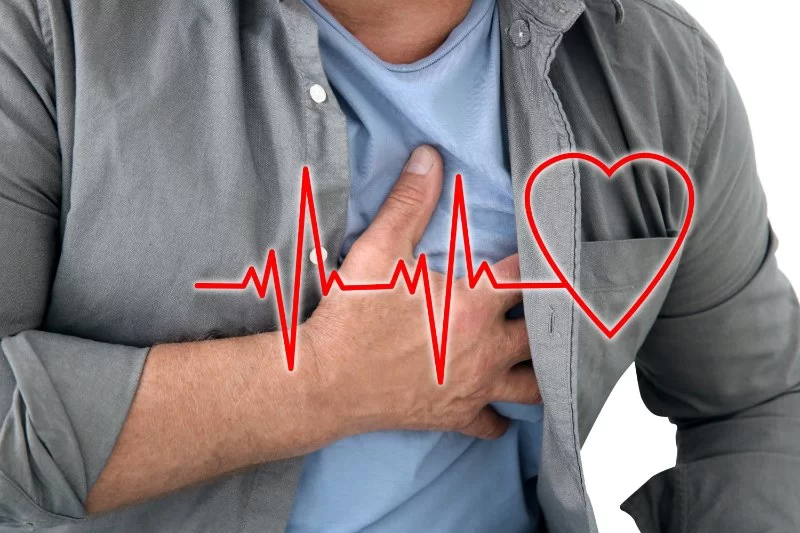- Understanding the Connection Between Anxiety and Heart Palpitations
- Common Triggers and Physical Responses
- Techniques to Prevent Palpitations Caused by Anxiety
- Real Stories and Expert Perspectives
- Lifestyle Changes for Long-Term Heart Calmness
- How HeartCare Hub Supports Your Heart and Mind
Understanding the Connection Between Anxiety and Heart Palpitations
Heart palpitations—those sudden, rapid, or pounding heartbeats—can feel frightening, especially when triggered by anxiety. Many people describe it as if their heart is skipping beats, fluttering, or racing for no clear reason. These sensations are often caused by the body’s “fight-or-flight” response, a natural reaction to stress that releases adrenaline into the bloodstream. This hormone prepares the body for action, but it also increases heart rate and blood pressure temporarily.
When anxiety is chronic or intense, these adrenaline surges may happen more frequently, leading to recurring palpitations. While anxiety-induced palpitations are usually harmless, they can be distressing and sometimes mimic symptoms of heart disease. Understanding the difference—and learning how to manage both the mind and body—is key to prevention and peace of mind.

Common Triggers and Physical Responses
Not all palpitations are created equal. Anxiety-related heart flutters are often linked to emotional stress, caffeine, lack of sleep, or even dehydration. The heart and brain communicate constantly through the autonomic nervous system, so when one becomes overactive—such as during a panic attack—it can set off a cascade of physical sensations.
In addition to racing heartbeats, anxiety may cause shortness of breath, chest tightness, sweating, and dizziness. These symptoms can mimic a cardiac event, which can further heighten anxiety and worsen the cycle. Experts recommend tracking when palpitations occur and what you were doing at the time—such as after coffee, during work stress, or before sleep. Identifying triggers is often the first step toward breaking the pattern.
Atlanta Heart Specialists
atlanta heart specialists
4375 Johns Creek Pkwy #350, Suwanee, GA 30024, USA

Techniques to Prevent Palpitations Caused by Anxiety
Preventing heart palpitations starts with calming both the mind and body. One of the most effective approaches is controlled breathing. Slow, deep breathing helps activate the parasympathetic nervous system, which slows the heart rate and reduces tension. Try inhaling through your nose for four counts, holding for two, and exhaling slowly for six. Practicing this several times a day can reset your body’s stress response.
Mindfulness meditation, progressive muscle relaxation, and light physical activity such as yoga or walking can also help regulate heart rhythm and ease anxiety. Reducing caffeine, alcohol, and sugar intake further minimizes overstimulation. Sleep quality plays a major role too—when you’re well-rested, your nervous system becomes less reactive.
Medical professionals also recommend regular checkups to rule out other causes, such as thyroid imbalance or arrhythmias. If palpitations persist, your doctor might suggest cognitive-behavioral therapy (CBT) or mild anti-anxiety medications to manage underlying stress.
Real Stories and Expert Perspectives
Sarah, a 40-year-old marketing executive, recalls how anxiety-induced palpitations disrupted her daily routine. “I would be sitting in meetings and suddenly feel my heart racing out of nowhere,” she says. After several cardiac evaluations ruled out physical causes, her doctor recommended mindfulness training and cutting down on caffeine. Within weeks, her episodes became less frequent and less intense.
Cardiologists like Dr. James Patel emphasize that anxiety-related palpitations are among the most common reasons people visit emergency rooms. “The good news,” he explains, “is that they’re usually benign once serious heart disease is ruled out. The focus should then shift to managing stress and improving emotional resilience.” This balanced approach helps patients gain both reassurance and control.
Lifestyle Changes for Long-Term Heart Calmness
Long-term prevention involves adopting habits that nurture both mental and cardiovascular health. Regular exercise helps regulate stress hormones, improve blood circulation, and stabilize heart rhythm. Activities like swimming, cycling, or brisk walking can be particularly beneficial. Pairing exercise with mindfulness—such as tai chi or gentle stretching—can amplify relaxation effects.
Nutrition also plays a powerful role. A diet rich in magnesium, potassium, and omega-3 fatty acids supports nerve and muscle function, helping keep heartbeats steady. Limiting processed foods, excess sodium, and stimulants reduces the risk of heart strain. Staying hydrated and maintaining a consistent sleep routine are equally important in calming the nervous system and stabilizing heart activity.
How HeartCare Hub Supports Your Heart and Mind
At HeartCare Hub, we understand that the line between emotional and physical health is deeply connected. Our platform offers trusted tools, wellness products, and expert resources to help you manage anxiety-related heart palpitations naturally and effectively. From relaxation aids and heart rate monitors to educational guides developed by cardiology specialists, we provide everything you need to regain confidence in your body’s rhythm.
Whether you’re looking to reduce stress, improve sleep, or adopt healthier habits, HeartCare Hub connects you with the right strategies and products to support both your heart and peace of mind. Because managing anxiety and heart health shouldn’t feel overwhelming—it should feel empowering.






















Deborah Heart and Lung Center
deborah heart and lung center
200 Trenton Rd, Browns Mills, NJ 08015, USA